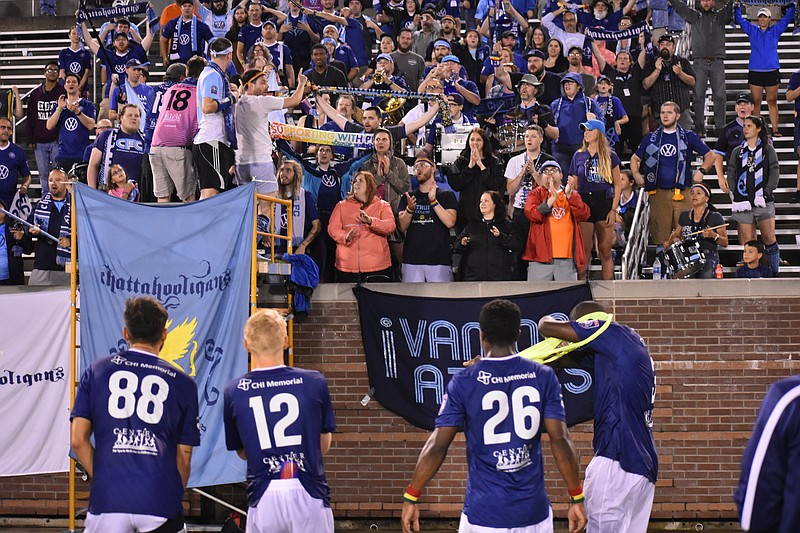There are two professional soccer teams in Chattanooga.
Yet there is only room in this town for one.
It matters who you cheer for.
Last year, the Chattanooga Red Wolves arrived, bringing its own approach to soccer: a distant owner who lives 1,700 miles away, a corporatized structure, zero relationship with Chattanooga.
Yes, the team plays good soccer, but the Red Wolves is a franchise, and like all franchises, it lacks novelty and a grassroots sense of place. Like Miller Lite. Fun to watch, but not very original. Or filling.
Then, there's the Chattanooga Football Club, or CFC.
Ten years ago, a group of local men built CFC with a stated mission: use soccer to build relationships and community.
CFC, they vowed, would represent something more than just soccer. A better world. A more loving city.
Beer? Think Chattanooga Brewing Co. Or Hutton & Smith. Something locally crafted. Deliciously original.
We're several games into our city's first summer with two pro soccer teams, and yes, there's a fight for fans and ticket sales.
But the story is more than that.
In the soccer world, we're witnessing the early shots of a revolution.
Chattanooga is a battleground in the growing philosophical and economic struggle over U.S. soccer.
"Chattanooga FC is challenging the hierarchy of American soccer," Howler magazine proclaimed.
It matters who you cheer for.
"Localism versus corporatism," said CFC co-founder Tim Kelly. "For Chattanoogans by Chattanoogans versus a top-down canned franchise owned and run by out of town people who don't give a damn about this place other than a community to extract money from."
Chattanooga Red Wolves is part of the United Soccer League, or USL, a network of more than 100 teams across three leagues based on a big-money system of purchased franchises that some say is unfair and elitist. (An anti-trust lawsuit was filed against the US Soccer Federation in 2018.)
CFC went another route - a community-based team.
"Community-based teams are tapping into a demand from many fans who do not want a corporate, 'Disneyfied' version of the game," Dr. Stefan Szymanski, author of "Soccernomics," told The Guardian.
CFC's owners - some of the finest men I know - also built Highland Park Commons, the futsal fields intended specifically for Hispanic Chattanooga. Then, an academy system. Chattanooga Sports Ministries. Operation Get Active.
A diverse fan base grew and the Chattahooligans grew louder. CFC set national attendance records - 18,000 in 2015 - while winning championships and consistently outselling both UT-Chattanooga football and Chattanooga Lookouts, thus changing our town's sports identity.
Other cities began to take notice.
So did the USL and its franchise owners.
"We are an existential threat to their business model," said Kelly. "We directly inspired Detroit City, Oakland, Asheville, Little Rock. If that continues to spread, people don't have to buy franchises."
In 2017, the USL began "courting" CFC, as one former board member told SoccerAmerica.
CFC said no.
Fast forward to fall 2018.
Enter the Red Wolves.
As many in Chattanooga celebrated the presence of a new pro soccer team, others saw the Red Wolves as a sort of hit job meant to ruin and run CFC out of business.
Why would an out-of-town owner without a stadium or established fan base choose a mid-sized city in SEC country? With an already successful independent soccer team in place?
(Calls and emails to Red Wolves president Sean McDaniel, CFC's former general manager who left in a cloud of financial suspicion, went unreturned. "We don't have anything to add to your story," said marketing coordinator Grace Stewart.)
So what's the future?
The Red Wolves want to build a $125 million restaurant-condo-stadium project in East Ridge. (The indefatigable Sandy Kurtz has raised environmental questions about floodplain and wetlands impact.) Nine home games remain; the team, playing at Chattanooga Christian School, hasn't lost there yet.
CFC just ended a Green Bay Packers-style public ownership campaign, as more than 3,200 fans invested $875,000. Dr. Szymanski bought shares. Soccer star Kyle Martino. Fans in Germany, Spain, United Arab Emirates. So many of you. (Me, too.)
For CFC, six home games remain, including the Founder's Cup tournament with other independent teams. There's talk of a documentary on the CFC-Red Wolves struggle.
"One exists to benefit Chattanooga and the other exists to use Chattanooga," said Matt Coniglio.
In 2009, at the second-ever CFC game, Coniglio, then 18, walked into Finley Stadium, not knowing a soul.
The early Chattahooligans embraced him.
It changed his life.
"Chattanooga FC exists to serve this city and its surrounding areas by being an institution of civic pride, a community gathering place, and resource for underprivileged children. Players become residents, fans become supporters, and all who walk through the gates of Finley become family," he said.
It matters who you cheer for.
David Cook writes a Sunday column and can be reached at dcook@timesfreepress.com.

